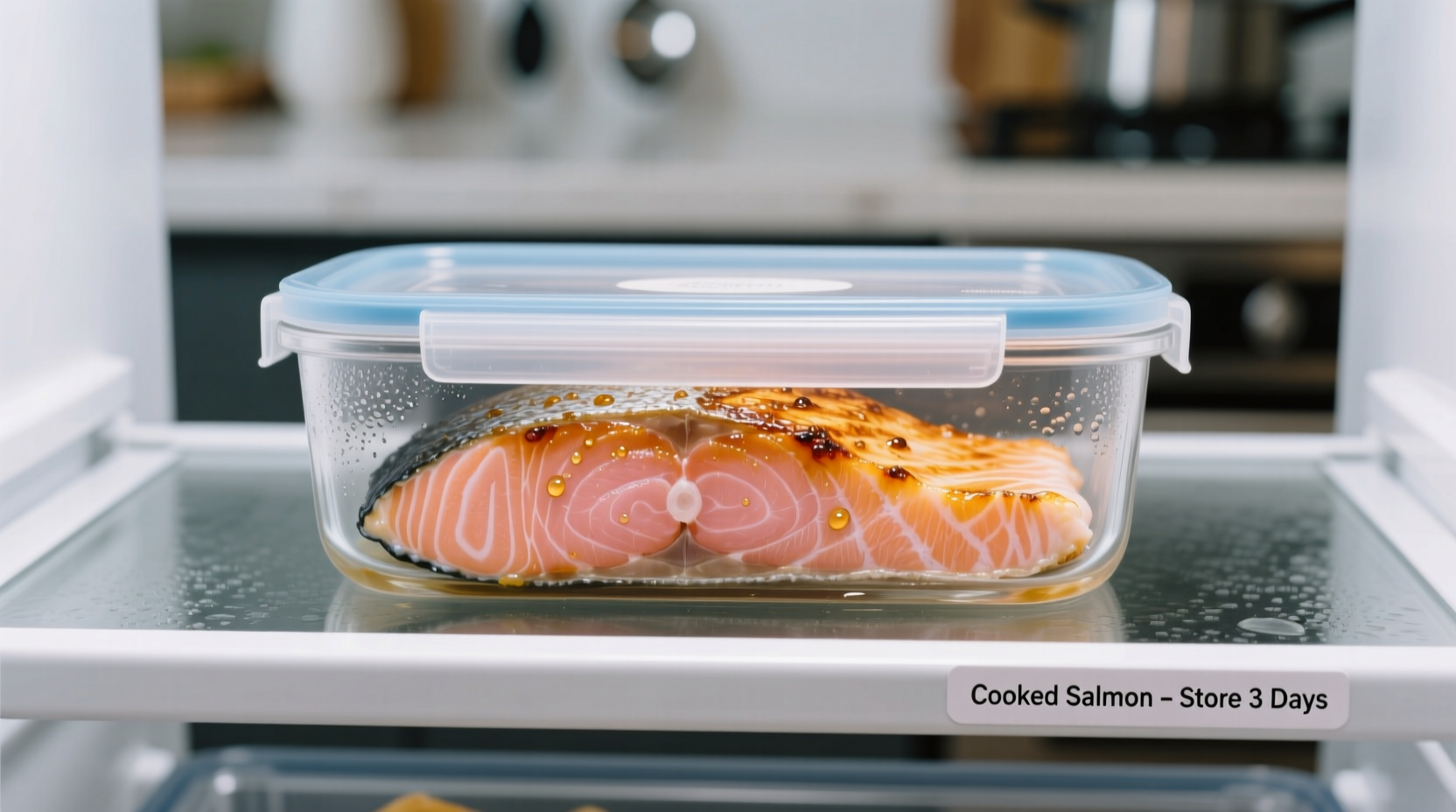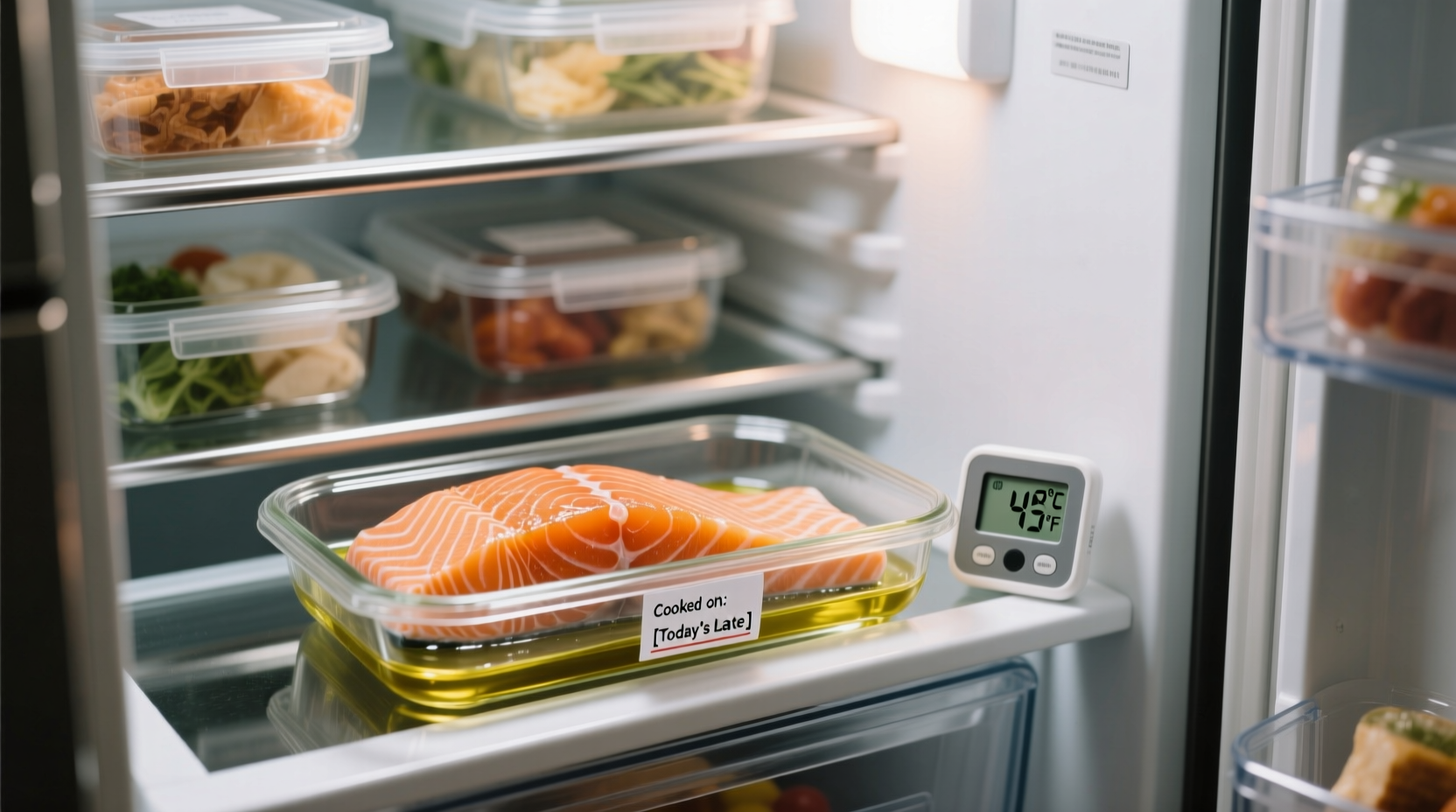Ever found yourself staring at leftover salmon wondering if it's still safe to eat? You're not alone. Proper food storage isn't just about preventing waste—it's crucial for avoiding foodborne illness. As someone who's worked in professional kitchens for over 15 years, I've seen how easily good food can turn dangerous when storage guidelines aren't followed.
Why Proper Cooked Salmon Storage Matters
Salmon contains proteins and moisture that create an ideal environment for bacteria growth when not stored correctly. Food poisoning from spoiled fish can cause severe symptoms including nausea, vomiting, diarrhea, and in extreme cases, hospitalization. The Centers for Disease Control and Prevention (CDC) estimates that 1 in 6 Americans get sick from contaminated food each year.
Official Food Safety Guidelines
The USDA Food Safety and Inspection Service provides clear guidance on cooked fish storage. Here's what their research shows:
| Organization | Cooked Salmon Refrigeration Time | Source Verification |
|---|---|---|
| USDA Food Safety and Inspection Service | 3-4 days at 40°F (4°C) or below | Cold Food Storage Chart |
| FoodSafety.gov (US government site) | 3-4 days | Cold Food Storage Charts |
| National Center for Home Food Preservation | 3-4 days | University of Georgia research |
Factors That Affect How Long Cooked Salmon Lasts
While 3-4 days is the standard recommendation, several factors can shorten or extend this window:
- Initial cooking temperature - Salmon cooked to 145°F (63°C) has fewer bacteria to begin with
- Cooling speed - Salmon left at room temperature longer than 2 hours develops bacteria faster
- Storage container quality - Airtight containers prevent cross-contamination and moisture loss
- Refrigerator temperature - Consistent 40°F (4°C) or below is critical (use a thermometer!)
Proper Storage Techniques That Extend Freshness
Follow these professional kitchen techniques to maximize your cooked salmon's shelf life:
- Cool quickly - Divide large portions into smaller containers to cool faster (within 2 hours of cooking)
- Use airtight containers - Glass or BPA-free plastic containers work best
- Store on middle shelf - Avoid the refrigerator door where temperatures fluctuate
- Place on paper towel - Absorbs excess moisture that accelerates spoilage
- Label with date - Write the storage date clearly on the container

How to Tell If Your Cooked Salmon Has Gone Bad
Don't rely solely on the calendar—use your senses to check for spoilage:
- Smell test - Fresh salmon has a mild ocean scent; spoiled salmon smells sour, ammonia-like, or strongly fishy
- Texture check - Fresh salmon is firm; spoiled salmon feels slimy or sticky
- Visual inspection - Look for discoloration (grayish tint) or visible mold
- Taste test (only if other signs are absent) - If it tastes sour or unpleasant, spit it out immediately
When in doubt, throw it out. The USDA emphasizes that "when food safety is questionable, it's never worth the risk."
What to Do With Leftover Cooked Salmon
Maximize your leftovers with these safe options:
- Day 1-2 - Enjoy as is or in salads where freshness matters most
- Day 3-4 - Use in cooked dishes like pasta, chowder, or casseroles where thorough reheating occurs
- After 4 days - Discard (don't risk food poisoning)
Freezing Cooked Salmon for Longer Storage
Can't eat it within 3-4 days? Freezing extends salmon's shelf life significantly:
- Wrap tightly in freezer paper or vacuum-seal
- Store at 0°F (-18°C) or below
- Properly frozen salmon lasts 4-6 months
- Thaw in refrigerator overnight before using
Common Mistakes That Shorten Salmon's Shelf Life
Avoid these food safety pitfalls:
- Leaving cooked salmon at room temperature longer than 2 hours (1 hour if above 90°F/32°C)
- Storing in the refrigerator door where temperature fluctuates
- Using containers that aren't truly airtight
- Placing warm salmon directly in the refrigerator (causes condensation)
- Reheating multiple times (increases bacteria growth risk)
Special Considerations for Different Salmon Types
While the 3-4 day rule applies broadly, certain preparations affect storage duration:
- Smoked salmon - Lasts 1-2 weeks due to preservation process
- Salmon in sauce - Reduces shelf life to 2-3 days (sauces often contain dairy)
- Canned salmon - Unopened lasts 3-5 years; opened lasts 3-4 days refrigerated
- Cold-smoked vs hot-smoked - Hot-smoked follows standard cooked fish guidelines
Food Safety Timeline Evolution
Food storage recommendations have evolved with scientific understanding:
- 1970s - General "use within a week" guidelines with little scientific basis
- 1990s - First temperature-specific recommendations from USDA
- 2000s - Introduction of the 4-day standard for cooked fish based on bacterial growth studies
- 2010s-present - Refinement of guidelines with specific container and cooling recommendations
These changes reflect improved understanding of bacterial growth rates in different food environments, as documented by the FDA Food Code.
Practical Tips for Busy Home Cooks
Make food safety part of your routine:
- Store leftovers immediately after eating (don't wait until dishes are done)
- Use clear containers so you can see contents without opening
- Implement a "first in, first out" system in your refrigerator
- Keep a small whiteboard on your fridge listing contents and dates
- Set phone reminders for when leftovers reach day 3
When Food Safety Guidelines Don't Apply
It's important to recognize the boundaries of these recommendations:
- Commercial food service follows stricter guidelines (often 72 hours maximum)
- Immunocompromised individuals should consume within 2-3 days
- Salmon cooked below 145°F requires shorter storage times
- These guidelines don't apply to raw fish (different storage rules)
Final Thoughts on Cooked Salmon Storage
Following the 3-4 day rule for refrigerated cooked salmon keeps you safe while minimizing food waste. Remember that food safety guidelines exist because foodborne illness is serious—not just inconvenient. By storing your salmon properly, checking for spoilage signs, and using your leftovers wisely, you'll enjoy delicious meals without risking your health.











 浙公网安备
33010002000092号
浙公网安备
33010002000092号 浙B2-20120091-4
浙B2-20120091-4